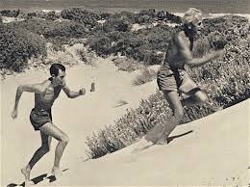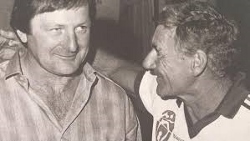The Best Coaches Are…
- Wednesday, December 06 2017 @ 10:45 pm ACDT
- Contributed by: Wesley Hull
- Views: 3,780


My first brush with a coach, apart from what I saw on television, was a bloke called Barry Burke. He played for Clayton, then in the Federal League, in suburban Melbourne. My Dad sometimes took me out to the quarter-time or half time breaks to “have a listen” to the coach. Apart from a requisite amount of swearing to motivate his team (stunning repartee was not one of his strengths), one catch-cry stuck. He would yell, “Do as I say, not as I do!” It was sound advice because he never set the world on fire on the field, but he did manage to yell a lot, and that seemed to work.
My own Dad was my next coaching experience. He took on the Under 11 B team, which I was in. There was no such thing as a free ride with Dad. If I played and trained well enough, I was in the 20. If I didn’t, I ran the boundary or water. For five years, Dad was my own John Kennedy or Ron Barassi. Later, he would become good friends with Tommy Hafey…but more on that later.
The next brush with coaching was, well, royalty. The old “friend of a friend” scenario. Actually, not quite. My Mum knew Nancy Cerutty, wife of the legendary coach, Percy Cerutty. My brother and I went to the house at Portsea on the Mornington Peninsula a good few times. Twice we met the great man. We would usually just play on the trampolines – professional ones set into the ground – and act like athletes.
This was the man credited with coaching Australian athlete, Herb Elliott, to an Olympic gold medal in Rome in 1960. Other great Australian athletes like John Landy and Betty Cuthbert fell under his influence. He was also famous for being at the forefront of the Aussie Rules fitness revolution when Hawthorn ran the Portsea sand-hills behind Cerutty’s home to build fitness – some say enough to win their first flag in 1961.
He was famous for saying great, inspirational things like “hard things take time to do, impossible things take a little longer.” He also once stated “if you die, I will bury you in the sand hills with all the other runners.” This quote resonated. Once my brother and I decided to REALLY be like athletes and run the sand hills track to Portsea Back Beach. Run is probably too strong a word – we both ambled along the track and I reached the beach with no brother in sight. I thought, quite wrongly, that he had in fact died and crawled off into the sand hills, though not in that order.
One day he said “hello” to us at the trampolines. Another day, whilst the women chatted, Percy himself invited my brother and I into his “trophy room”. It was his version of Dave Kerrigan’s “pool room” (if you don’t get the Kerrigan reference, I strongly suggest you hire out the Australian movie “The Castle” and be educated). The difference was that I saw my first Commonwealth Games medals and a replica of Herb Elliott’s Olympic gold medal (at least I think it was a replica). Around the walls were photos of some of the world’s greatest athletes – autographed.
I have never forgotten my brush with fame, and most particularly a great (albeit controversial) coach. Of all the mantras Cerutty is known for, one rings true to me even today. “If the coach cannot do it, he cannot ‘teach’ it – only talk about it.” That is an idea that I have always stuck to – I am not saying it is correct or otherwise – just that I have lived it all of my coaching life, and it is a lasting legacy of my connection (admittedly brief) with the great man.
(Incidentally, Percy was born in Prahran, and I was born in Margaret Cole Hospital in Prahran. Kevin Sheedy is one of Prahran’s greatest exports, even though he was technically born in South Yarra, which is as close to Prahran as you can get. I sometimes wonder if there is something symbiotic about that….probably not!)
Since 2001 I have been coaching at junior and senior level. I have researched the art of coaching to be more knowledgeable, and played until I was 56 this year to remain as relevant as possible. Along the way I have gathered a list of coaching traits that have seen me enjoy many successes, as well as the players who have played for me. Some of these might be of value to anyone considering taking on a coaching role…maybe even help those already coaching.
To break a player emotionally is, to me, just wrong. If a coach has any purpose at all – other than teaching – it is to inspire. That can be by word or deed, and might simply be an arm around a shoulder or a whispered word. A player MUST believe in themselves to function, and tearing into a player (of any age, but especially kids) cannot possibly build that belief.
Communication sits at the heart of every good coach. The ability to impart a message is only one facet of the art of communication. It is tied to the idea of inspiration – able to say the right things at the right time, to get the best out of a person – or equally to help work on the not so good. But the ability to communicate has to transcend the arena. The best coaches can communicate with players, certainly, but must also be able to speak to community, family, club people at any level, umpires, opposition – really, anyone at any time. If that sounds far-fetched, consider one Kevin Sheedy (again) and how his success to this day goes far beyond an ability to communicate with players. He is successful because he can draw out the information from people just as well as he imparts it.
A passionate coach knows how to lose just as much as an impassionate one can win. Poor coaches have won premierships, passionate lovers of the game have won wooden spoons. But based on experience, footy at junior levels and even into senior ranks is a journey for players. The passionate coach who loves the game and every facet of the game can infuse that passion in their players. They can make the journey exciting, delightful, rewarding. They can instil a love of the game into those around them – the result often being a player that wants to be a part of that passion.
I don’t think stats exist for this, but I’m willing to bet that more premierships have been won by passionate coaches than not. I would also say that, more importantly, players have been more successful when in the company of coaches who make them believe and make them want to aspire to great things.
A good coach doesn’t know everything. They might well know a lot, but they are also prepared to keep on learning. A good coach is on the same journey as their players, just in different clothes. Coaches that get above their station and believe they cannot learn anymore will almost certainly burn out. The good coach can learn from almost any conversation or situation. A good coach can understand that they are not bigger than the game, but a part of the mechanisms that drive the game. They work in synch with everyone, and are humble enough to learn from defeat or hardship, just as much as they learn from success.
There are probably so many other gems from other great coaches that aren’t mentioned here. But I have always been prepared to read, watch, listen – whatever it takes to be better. I imagine there are snippets of other coaches in me that I’m not aware of. Maybe I am possessed by many other footballing spirits, after years of watching footy replays, live matches and any other exposure – and not just Aussie Rules. My coaching is probably the sum of many, many parts. However, I think that is healthy.
My dad once said,“you give me one hundred percent of your commitment, courage, talent, integrity, effort and knowledge and the scoreboard doesn’t matter.” They were wise words, and most likely he picked them up from someone else. If he did, that just adds to my own argument. If he made them up – You Rock, Dad! But, they have been my modus operandi ever since he said them in my presence. It is amazing what you can learn if you are prepared to listen. That is a good coach.
I mentioned earlier that I would return to the great Tommy Hafey. Truth is, he only ever said three or four words to me down at Tideways Beach in Sorrento. He and dad were having a chat on their morning walk, and he turned to me and said “How are you, son?’” when Dad introduced me to him. I am probably paraphrasing – it was a long time ago. But it was about four words. The reality is he may have said, “I love pizza”, or “nice day for swimming”, or “get of my property”.
It didn’t matter. He took the time to speak to me and I was delirious with happiness. He wasn’t bigger than the game, he communicated, he inspired me and he showed me passion in his preparedness to embrace a fan. He was also humble and displayed his integrity to me via my Dad.
Maybe, just maybe, that is why he was such a great coach.


 RSS news
RSS news Twitter
Twitter Facebook
Facebook